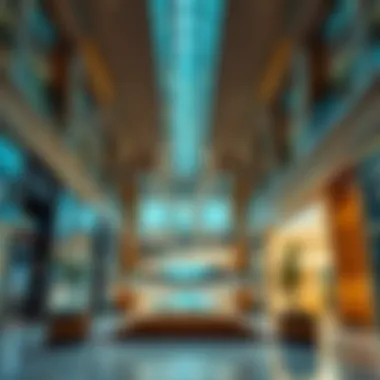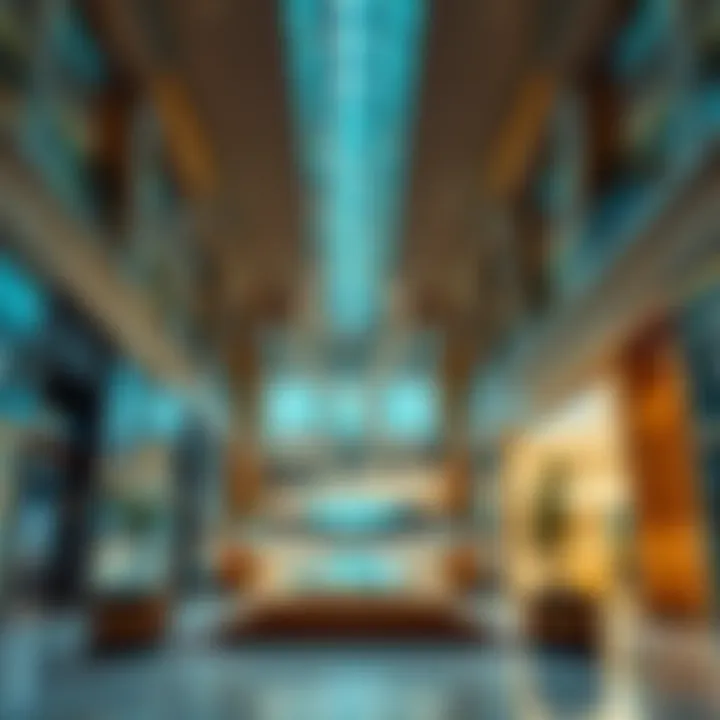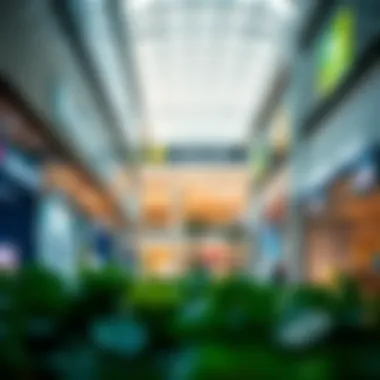Exploring Masdar City Mall: Innovation and Sustainability


Intro
Masdar City Mall stands as a remarkable testament to the integration of sustainability with modern retail. Nestled in the heart of Abu Dhabi, this shopping destination does not merely serve as a place for buying goods; it embodies a visionary approach toward urban living, with a focus on innovation and ecological responsibility. As we dive into the mall's offerings, design aspects, and its broader relevance within the context of Masdar City, it becomes clear that it’s more than just a structural marvel—it's a living example of what the future of urban design can be.
At its core, the mall promotes an ethos of sustainability through every facet of its existence. From how it harnesses renewable energy sources to the materials utilized in its construction, the focus is on creating a space that reflects the ideas behind the Masdar initiative. Here, shoppers and visitors experience a melding of cutting-edge technology and environmentally conscious design, making the mall a unique space that draws both locals and international tourists.
By exploring the design and amenities within Masdar City Mall, we seek to uncover not only its operational success but also its potential implications for economic growth in the area. The mall stands at a crossroad where retail innovation meets sustainable urban planning, which is a theme that resonates with investors keen on eco-friendly projects and consumers alike who increasingly prefer shopping destinations that align with their values.
In the sections that follow, we will delve into current market trends that shape the real estate landscape around Masdar City, alongside guidelines for those interested in both buying and renting property in this burgeoning area. Understanding these dynamics is crucial for anyone looking to engage with this innovative hub, ensuring they are well-informed and equipped to make sound decisions, whether they are investors, home buyers, or aspiring renters.
Understanding Masdar City
Masdar City represents more than just a collection of buildings; it embodies a visionary approach to urban living that privileges sustainability and innovation. This context is crucial for understanding the subsequent development of the Masdar City Mall, the focal point of commerce and community interactions within this emerging hub. As we delve into its historical roots, goals, and initiatives, a broader picture emerges—one that interweaves economic aspirations with ecological sensibilities.
Historical Context
Masdar City commenced its journey in 2006, aiming to create a blueprint for sustainable urban development. This was a period defined by an increasing global awareness regarding climate change and the pressing need for eco-friendly technologies. The visionaries behind Masdar sought to mitigate the environmental impact traditionally associated with urban growth. They set forth ambitious plans to create a zero-carbon city, where renewable energy sources would fuel daily life. Over the years, the city has transformed, showcasing innovative technologies, from solar power to autonomous transport, all nestled within a modern architectural landscape. The historical backdrop not only informs the aesthetic of the mall but also its conceptual foundation, where sustainability meets lifestyle.
Key Development Goals
The goals laid out for Masdar City are multifaceted. First and foremost, there is a resolute commitment to sustainability, aiming to reduce the ecological footprint of urban living. The city strives to achieve a blend of technology and nature, allowing harmonious coexistence. Additionally, economic vitality remains a priority; the aim is to attract businesses that align with these sustainable practices while fostering local employment opportunities.
Key development goals include:
- Sustainable Energy Production: Utilizing solar energy to power city functions.
- Innovative Transportation Systems: Fostering the development of electric and autonomous vehicles, making connectivity seamless.
- Community Engagement: Encouraging partnerships between businesses, residents, and educational institutions to cultivate a culture of sustainability.
All these objectives converge in the mall, setting a precedent for future commercial developments.
Sustainability Initiatives
An essential aspect of Masdar City's ethos is its dedication to pioneering sustainability initiatives that pervade the mall and its surroundings. The approach is not merely about reducing waste or increasing recycling; it's about redefining how inhabitants interact with their environment.
Initiatives taken include:
- Water Conservation: Innovative systems capture and recycle water, a critical resource in the arid landscape of Abu Dhabi. This ensures that the mall may operate efficiently without depleting local reserves.
- Renewable Energy Utilization: The mall is powered by a blend of renewable energy solutions, showcasing solar panels not only as a source of energy but as architectural elements.
- Green Building Standards: The construction adheres strictly to principles of energy efficiency and sustainable materials usage, establishing a model that can be emulated globally.
"Sustainability in urban design is not just a trend; it’s a fundamental shift toward a more viable future."
As we analyze these initiatives, it's evident that Masdar City Mall isn't just a space for shopping; it symbolizes a progressiv mindset and a commitment to a sustainable lifestyle, resonating deeply with both local and international visitors while catching the eye of investors looking for innovative ventures.
Masdar City Mall Overview
Understanding the intricate dynamics of the Masdar City Mall is paramount to grasping its significance in the broader narrative of urban sustainability and innovation. Situated within one of the most ambitious sustainable cities in the world, the mall serves not merely as a shopping destination but as a beacon of what modern architecture and design can achieve with a commitment to eco-friendliness and functionality.
The purpose of this overview is to illuminate key elements, benefits, and considerations surrounding Masdar City Mall. For investors, designers, and urban planners alike, the mall stands as a case study in addressing contemporary challenges, from sustainable retail practices to community engagement strategies.
Architectural Design
The architectural design of Masdar City Mall is a testament to the principles of sustainable building. Created by world-renowned architects, it blends cutting-edge technology with traditional Arabic design. The use of solar-covered canopies and passive cooling techniques showcases how form can meet function while focusing on minimizing environmental impact. Large glass facades not only invite natural light but also offer stunning views of the surrounding landscape. This design invites not just admiration but also serves as a practical element, ensuring that energy consumption is kept to a minimum.
"The challenge is to generate a space where nature and urban life coexist, fostering a sense of community while respecting the natural environment."
Location and Accessibility
Masdar City Mall is strategically positioned to maximize accessibility for both local residents and visitors. Located just a short drive from Abu Dhabi International Airport, the mall benefits from excellent transport links, including public transportation options that cater to city-wide and regional travelers. With designated pathways for pedestrians and cyclists, it promotes a lifestyle that encourages eco-friendly commuting methods. This consideration of various transport modes emphasizes Masdar City’s broader commitment to sustainability.
Accessibility extends beyond transportation; the mall is designed with inclusive features, ensuring it meets the needs of everyone. These attributes increase its appeal as a versatile venue for shopping, entertainment, and social gatherings.
Size and Scale
In terms of size and scale, Masdar City Mall stands out as one of the largest shopping centers in the region, providing over a substantial number of retail spaces. Covering a significant area, it encompasses a diverse mix of local and international brands, catering to a wide range of consumer preferences.


This scale is not just about size; it impacts the economic landscape, creating numerous opportunities for employment while bolstering the local economy. Whether one is looking to shop, dine, or simply enjoy the architectural beauty, the sheer scale of the mall ensures there is something for everyone.
In summary, the Masdar City Mall is an essential player in Abu Dhabi's evolving urban ecosystem. Its design, accessibility, and expansive scale work together to forge a retail environment that aligns with principles of sustainability, making it a model for future developments.
Innovative Retail Experience
The concept of an innovative retail experience is pivotal in the broader context of Masdar City Mall. As retailers face new consumer demands and shifting market dynamics, the idea of providing an engaging, holistic shopping environment takes on greater significance. In Masdar City Mall, this is achieved through a blend of diverse shopping options, sustainable practices, and customer engagement strategies that create a distinctive marketplace, setting a shining example for other retail spaces.
Diverse Shopping Options
Masdar City Mall showcases a broad spectrum of shopping choices that cater not only to diverse consumer preferences but also to different shopping philosophies. This isn’t just about filling shelves with products; it’s about carefully curating a mix of local artisans and international retailers.
- Local Artisans: Imagine walking past stalls brimming with handcrafted trinkets and eco-friendly products that tell the story of Abu Dhabi's rich cultural heritage. The promotion of local artists is not only a boon for small businesses but also resonates with shoppers looking for unique items.
- International Brands: On the flip side, the mall features popular global brands, giving visitors a taste of global retail in a sustainable format. These choices provide something for everyone, transforming a simple shopping trip into a memorable outing.
This harmonious blend encourages consumers to explore and discover new products, making shopping at Masdar City Mall much more engaging than traditional retail experiences.
Sustainable Retail Practices
In a world increasingly concerned with environmental issues, Masdar City Mall pioneers sustainable retail practices that resonate deeply with eco-conscious shoppers. The mall implements energy-efficient technologies that reduce operational costs while minimizing environmental impact.
For example:
- Solar Panels: The use of solar energy for electricity needs signifies a strong commitment to sustainability, attracting investors who value ethical business measures.
- Eco-Friendly Retailers: Each retailer is encouraged to engage in sustainable practices, whether it's through sourcing locally, using biodegradable packaging, or offering reusable shopping bags. Shoppers know that their spending contributes to greener initiatives.
"Sustainability isn't just a trendy concept; it's a core principle of our retail strategy at Masdar City Mall."
Customer Engagement Strategies
Understanding the customer is crucial for any retail space, and Masdar City Mall shines in this area. Innovative engagement strategies create a connection between the mall and its visitors, enhancing their shopping experience.
- Interactive Displays: Tech-infused windows and smart digital signage offer an engaging prelude to in-mall experiences, drawing people in. This type of interactivity ensures that visitors not only come to shop but to experience.
- Events and Workshops: Hosting local events, art exhibitions, and workshops is a brilliant way to cultivate a community vibe. It goes beyond consumerism; it gets people involved, and invested, making them feel like a part of something greater.
The combination of these elements not only enhances customer experience but also bolsters loyalty, ensuring that people regularly return to the mall.
Through these innovative retail experiences, Masdar City Mall serves as a model for what consumers expect today—an intersection of tradition, sustainability, and cutting-edge innovation. As the retail landscape continues to evolve, the lessons from Masdar City Mall will undoubtedly inspire others in the field.
Economic Impact on Abu Dhabi
The Masdar City Mall stands not merely as a shopping destination but as a pivotal player in reshaping the economic landscape of Abu Dhabi. This section will probe into how the mall influences job opportunities, attracts substantial investments, and exerts its influence on local businesses. Understanding these elements is essential, as they highlight the mall's role in not just supporting consumer activity but also fostering sustainable economic growth in a rapidly evolving urban environment.
Job Creation
Creating job opportunities is often seen as the backbone of any thriving economy, and Masdar City Mall is no exception to this rule. The mall has opened its doors to a variety of roles across different sectors—from retail management to customer service, logistics to marketing. The ripple effect of these jobs extends beyond the immediate workforce; they provide livelihoods for families and contribute to the overall standard of living in Abu Dhabi.
Notably, research indicates that for every retail job created, several others are often supported in associated sectors such as transportation, hospitality, and food services. This interconnected web not only strengthens the economic fabric of the city but also nurtures a diverse talent pool that meets the demands of a modern marketplace.
Attracting Investment
Masdar City Mall acts as a beacon for potential investors. With its focus on sustainability and innovative design, it captures the attention of not just local investors but also international stakeholders. The mall embodies a commitment to creating a retail environment that aligns with global environmental standards, making it an attractive option for investments focused on sustainability.
Foreign direct investment often gravitates towards projects that promise returns through progressive practices. Thus, the mall’s integration of green technologies and sustainable practices positions it as an investment opportunity that resonates well with eco-conscious investors. Investors interested in aligning their portfolios with sustainable practices find Masdar City Mall a noteworthy prospect.
Influencing Local Businesses
The presence of Masdar City Mall brings both competition and collaboration to the local business landscape. For smaller enterprises, operating alongside a large entity has its advantages; it elevates brand visibility while offering shared customer bases. Local stores can capitalize on increased foot traffic generated by the mall, allowing them to capitalize on the influx of visitors.
Moreover, the mall's sustainable ethos often encourages local businesses to adapt similar practices, fostering a community committed to environmental responsibility. Collaborations may arise between the mall and local artisans, resulting in unique products that embody the spirit of both Masdar City and Abu Dhabi. This symbiotic relationship helps to fortify local economies, contributing significantly to the overall economic advancement of the emirate.
"The synergy between large-scale retail and local businesses encapsulates the vision of sustainable growth in Abu Dhabi."
Visitor Demographics and Trends
Understanding visitor demographics and trends is crucial for the ongoing success of Masdar City Mall. As a hub of innovation and sustainability, it attracts a diverse audience. By analyzing the profiles and behaviors of these visitors, stakeholders can tailor services and marketing strategies to enhance customer experience and engagement. Knowledge of who visits the mall, what they seek, and the trends affecting their shopping habits can significantly influence investment decisions and operational strategies.


Local vs. International Visitors
Masdar City Mall draws both local residents and international tourists.
- Local Visitors: These include Emiratis and expatriates who frequent the mall for various reasons—shopping, dining, or engaging in community events. They often appreciate the mall’s commitment to sustainability, favoring brands that align with eco-friendly practices. Their familiarity with the area allows them to influence word-of-mouth marketing, which can be invaluable for businesses operating in the mall.
- International Tourists: The mall also captivates visitors from across the globe, especially those keen on sustainability and innovation. Tourists often look for unique shopping experiences that reflect local culture while offering modern conveniences. The blend of retail options, from luxury brands to authentic local products, caters to this diverse crowd.
This mix of local and international patrons creates a dynamic shopping atmosphere that can prompt businesses to adapt their strategies, appealing to varied tastes and expectations.
Consumer Behavior Patterns
Analyzing consumer behavior at Masdar City Mall reveals several fascinating trends. Visitors often exhibit a heightened awareness of sustainability. Shoppers are becoming more selective, favoring products and services that demonstrate environmental responsibility.
- Preference for Green Products: There’s a growing trend among consumers to choose brands that prioritize sustainability in their supply chains. Shoppers may seek items made from organic materials or companies that practice fair trade.
- Experience Over Spending: Many visitors are shifting their focus from pure consumption to experiential shopping. They look for interactive installations, workshops, or events that enhance their visit. This evolution impacts how retailers design their spaces and customer interactions.
"People want more than just to shop; they want stories and experiences wrapped in their purchases."
Understanding these behavioral shifts can help retailers craft more engaging experiences, ensuring that they not only meet customers' immediate needs but also foster long-term relationships with them.
Impact of Tourism
Tourism plays a pivotal role in shaping the demographics and trends observed at Masdar City Mall. The influx of international visitors can significantly boost the local economy, making it a melting pot of cultures and preferences. There are several noteworthy impacts of tourism on the mall:
- Economic Contributions: Increased foot traffic results in higher sales for retailers and boosts the local economy. Additional revenue can lead to more jobs and investment opportunities within the community.
- Cultural Exchange: Tourists often share their experiences and preferences, influencing local tastes and trends. This cultural blend can inspire new retail offerings that appeal to both residents and visitors alike.
- Brand Visibility: Having a reputation as a tourist-friendly destination can heighten brand visibility for retailers within the mall, attracting partnerships and collaborations with international brands.
The trends in visitor demographics, especially influenced by tourism, highlight the mall's position as a crucial player not just in retail but in the broader social and economic landscape of Abu Dhabi. Stakeholders need to keep an ear to the ground regarding shifting consumer preferences to maintain the mall's relevance and attractiveness.
Sustainability in Design and Operations
Sustainability in design and operations stands at the core of Masdar City Mall’s ethos. This facility represents not just a retail destination but a commitment to environmentally-conscious architecture and operational practices. Effectively marrying function and environmental responsibility, the mall seeks to demonstrate that retail can thrive without compromising the planet’s well-being.
Energy Efficiency Measures
Reducing energy consumption is a vital goal tied to the broader sustainability narrative. At Masdar City Mall, energy efficiency measures are implemented in several innovative ways.
- Utilization of Renewable Energy: The mall prominently utilizes solar panels, harnessing the power of the sun, a resource abundant in Abu Dhabi. This move not only reduces the carbon footprint but also cuts operational costs in the long run.
- Smart Building Technologies: Advanced systems manage lighting and temperature, adjusting in real-time to current weather conditions and occupancy levels. This ensures that unnecessary energy use is kept at bay.
- High-Performance Materials: The choice of materials used in construction also plays a critical role in energy efficiency. Insulation that minimizes heat transfer contributes to lower air conditioning demands, a significant factor in a hot climate like that of the UAE.
These measures, focusing on both immediate and long-term impact, position the mall as a beacon of energy efficiency, appealing to environmentally-conscious investors and consumers alike.
Water Management Practices
Water is a precious resource in arid regions, and Masdar City Mall employs various water management strategies that exemplify best practices in sustainability.
- Recycled Water Systems: Implementing a greywater recycling system allows for the reuse of water for irrigation and other non-potable purposes. This practice lessens the demand on freshwater supplies, promoting conservation.
- Smart Irrigation Techniques: The mall's landscaping features drought-resistant plants, coupled with smart irrigation technology that optimizes water use. By deploying sensors, the system ensures water is only applied when necessary, reducing waste.
- Rainwater Harvesting: Though rare in the region, any rainfall is captured and stored, providing yet another water source. Maximizing every drop is crucial in the drive for sustainability.
The combination of these practices underscores the commitment to responsible water stewardship, an essential aspect for sustainable retail developments in water-scarce areas.
Waste Reduction Strategies
Waste management is a critical challenge for any large-scale operation, especially in a commercial setting. Masdar City Mall embraces waste reduction strategies that reflect an understanding of their responsibility towards the environment.
- Comprehensive Recycling Programs: The mall employs extensive recycling programs for both customers and tenants. By providing accessible bins and raising awareness, they are guiding people toward responsible waste disposal.
- Collaboration with Local Farms: Surplus food from restaurants and food courts is redirected to local farms as animal feed, minimizing food waste and promoting local agriculture.
- Sustainable Packaging Options: Retail tenants are encouraged to adopt eco-friendly packaging materials, encouraging consumers to make choices that align with their values regarding sustainability.
These waste reduction strategies highlight a forward-thinking approach that prioritizes both the environmental and economic impact of operations, ensuring that sustainability is embedded in the mall’s daily routine.
"To achieve sustainability, every facet of design and operations must be evaluated through the lens of environmental impact," says Jane Smith, a sustainability expert.
As Masdar City Mall continues to evolve, its commitment to sustainability in design and operations sets a benchmark for future developments, cementing its role in shaping a more sustainable retail environment.
Future Prospects and Expansions
The future of Masdar City Mall holds a critical place within the growth narrative of both Masdar City and Abu Dhabi as a whole. As a developmental centerpiece, it is not just a shopping venue, but a model of sustainable urban living. Investments in its expansion will likely spur greater economic vitality and draw both local and global interest to the region. Moreover, the mall’s innovative ethos will augment its existing appeal, solidifying its position as a focal point for those keen on investing in sustainable practices.
Potential Expansion Plans


With sustainability being the cornerstone of Masdar City, expansion plans for the mall must reflect that. As the demand for environmentally-conscious shopping options grows, stakeholders have begun to outline plans that would include:
- Renewable Energy Integration: Enhancing the existing solar and wind energy implementations to provide additional power to future expansions.
- Eco-Friendly Retail Spaces: Introducing dedicated zones for brands focusing on green products to cater to a rising consumer base that prioritizes sustainability.
- Cultural and Community Centers: Creating spaces within the mall that foster community engagement through workshops, exhibitions, and local markets, embodying the idea of a communal hub.
These plans stand to reinforce the connection between commerce and community, ensuring the mall remains relevant while bolstering Masdar City’s overarching sustainability mission.
Emerging Retail Trends
As consumer attitudes evolve, so do retail trends. Observations from recent years paint a clear picture of a shift towards:
- Experiential Retail: Shoppers are increasingly looking for experiences over transactions. The future mall could capitalize on innovations such as AR-driven shopping, giving consumers an interactive layer to their retail experience.
- Sustainable Products: A significant surge in demand for eco-friendly product lines offers opportunities for brands that prioritize sustainable sourcing and ethical practices. Retailers in the mall might consider adhering to circular economy principles, making their operations more environmentally sound.
- Technological Enhancements: Integrating AI and IoT technologies can create personalized shopping experiences. Imagine if kiosks could recommend products based on past purchases or offer real-time inventory updates.
These trends mark a wave of change that, if harnessed, could pave the way for increased foot traffic, economic viability, and consumer satisfaction.
Long-Term Vision for Masdar City
Over the long haul, envisioning Masdar City as one of the leading global landmarks in sustainable urban development is not far-fetched. Key aspects of this vision include:
- A Model for Future Cities: By demonstrating how economic and environmental sustainability can coalesce, Masdar City can set benchmarks for urban planning worldwide. Other cities might follow this blueprint, enhancing the mall’s role as an educational site for sustainable practices.
- Global Partnerships: As Masdar City evolves, forming partnerships with universities, tech companies, and sustainability initiatives could bolster research and foster innovations that benefit the mall and its tenants.
- Continual Adaptation: The landscape of retail and consumer needs is always changing. Adapting strategies and expanding the mall’s offerings over time will ensure that it remains a hotbed of activity in Abu Dhabi.
Ultimately, the forward-looking focus of Masdar City Mall not only enriches Abu Dhabi's economy but also embodies a broader commitment to a sustainable future—an ambition that aligns with global efforts to address pressing environmental challenges.
"Sustainability isn’t just a trend; it’s a necessary paradigm shift for the future of our cities."
For further information on Masdar and sustainable city development, you can explore Masdar's official site, or visit resources like Wikipedia for a broader understanding of urban sustainability initiatives.
Challenges and Considerations
Examining the challenges and considerations surrounding Masdar City Mall is paramount for understanding the broader impact of such innovative developments in urban environments. These challenges do not only shape the operational landscape of the mall but also influence investors, retailers, and the community at large. Identifying and addressing these issues can ultimately steer the project towards success, ensuring its alignment with sustainable objectives that underpin Masdar City itself.
Economic Barriers
One of the significant hurdles facing Masdar City Mall pertains to economic barriers. Initially, the high costs of sustainable technologies can be daunting for investors and developers alike. Sustainable building materials and energy-efficient systems often come with a hefty price tag, which might deter investment unless coupled with clear benefits or incentives. For instance, the upfront costs of installing solar panels or rainwater harvesting systems can be substantially higher than traditional methods. However, the longer-term savings on energy and operational costs are becoming increasingly apparent, as governments and institutions promote green initiatives that reward sustainable practices—ultimately making these investments more attractive.
Moreover, the economic climate can fluctuate, impacting consumer spending behavior. During times of economic downturn, discretionary spending tends to decline. Retailers in Masdar City Mall must remain cognizant of such trends, adjusting their strategies to cater to the prevailing economic mood while still championing sustainability in their operations.
Cultural Acceptance
Cultural acceptance plays a pivotal role in shaping the success of Masdar City Mall. Abu Dhabi is a melting pot of cultures, and understanding the diverse backgrounds of its visitors is essential for creating an inclusive atmosphere. Retailers might face difficulties in bridging cultural gaps if their offerings do not resonate with local communities or international visitors alike. Simply put, what works for one culture may not hold appeal for another.
For instance, the mall’s sustainable ethos must not only be marketed but also embraced by the local community. Awareness campaigns that educate the public about green practices can foster a sense of ownership and pride around sustainability initiatives. Such efforts may help in instilling a culture that values environmentally conscious consumerism. It's crucial for Masdar City Mall to actively engage with the diverse customer base, customizing experiences that speak to the varied cultural narratives of the shoppers who walk through its doors.
Technological Limitations
Another consideration centers around technological limitations. While the mall is designed to showcase cutting-edge sustainable technologies, implementation often encounters real-world hurdles. Constraints such as a lack of skilled labor familiar with these technologies can impede the seamless integration of renewable energy sources and smart systems within the mall's framework. Additionally, the rapid pace of technological advancement can create a scenario where yesterday’s innovations quickly become outdated.
For example, energy management systems that monitor and optimize consumption might face integration issues with existing infrastructure if not designed with flexibility in mind. Furthermore, bugs in software applications that manage these systems can lead to increased operational hiccups, putting a strain on resources. Hence, ongoing training and development of the workforce are vital to ensure that the personnel can adapt to and maintain these evolving technologies effectively.
The End: The Role of Masdar City Mall
As we peel back the layers of Masdar City Mall, it becomes clear that its role extends far beyond that of a conventional shopping destination. It embodies a vision that merges contemporary retail with an unwavering commitment to sustainability. This synergy not only fosters an environment where innovation thrives but also sets a benchmark for future developments in Abu Dhabi and beyond.
Reflection on Sustainability and Innovation
The essence of Masdar City Mall lies in its potential to reshape urban experiences. Sustainability is not merely an aesthetic choice here; it's woven into the very fabric of the mall's design and operations. From energy-saving technologies to water conservation efforts, every corner reflects efforts to create a minimized carbon footprint.
Moreover, the integration of innovative technologies like smart parking systems and climate-responsive architecture showcases how modern retail can harmonize with ecological objectives. Shoppers are not just consumers; they are part of a broader narrative—one that encourages mindful spending and community engagement.
"In many ways, Masdar City Mall is a litmus test for equal parts sustainability and economic viability. If this mall thrives, it may just change the retail landscape forever."
Here are some noteworthy aspects reflecting this balance:
- Solar Energy Usage: Utilizing solar panels not only powers essential functions but also educates visitors about renewable energy.
- Green Spaces: The incorporation of parks and green roofs creates an oasis within the bustling retail space, promoting biodiversity.
- Community-Focused Events: Regular workshops and events centered around sustainable practices bring people together, fostering a culture of conscious consumerism.
- Local Artisans and Entrepreneurship: By hosting local businesses, the mall supports economic diversity while highlighting local culture.
The overarching significance of Masdar City Mall cannot be understated. It stands as a beacon of hope in an era where urban development is often at odds with environmental integrity. Involvement from investors, urban planners, and citizens alike will be crucial as this model of sustainable innovation unfolds.
For further insights on sustainability and retail innovations:
- Wikipedia - Masdar City
- Sustainability in Retail
- REDDIT - Urban Innovations
- Government Resources on Sustainability













